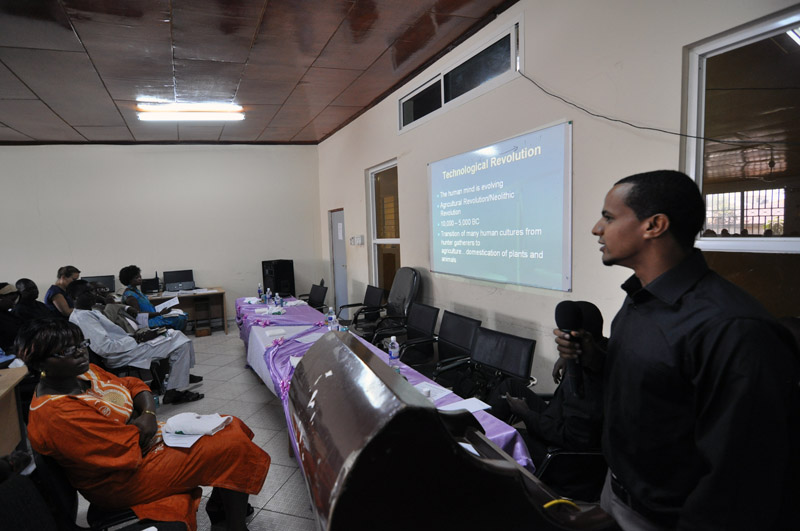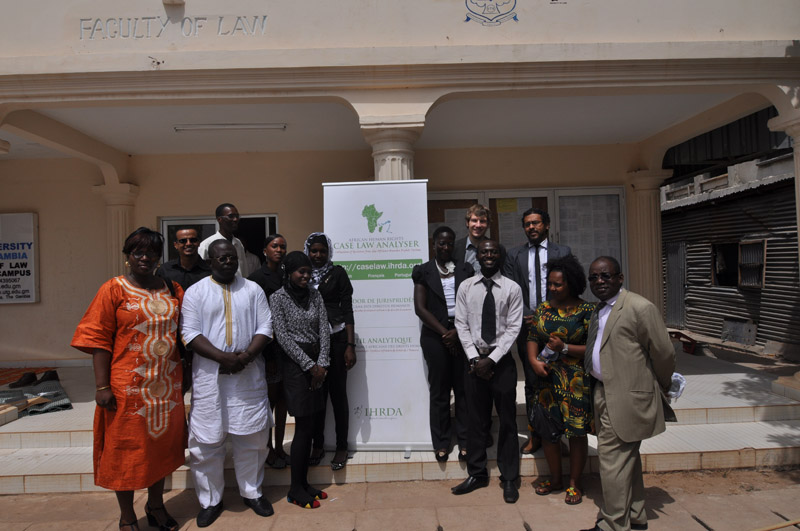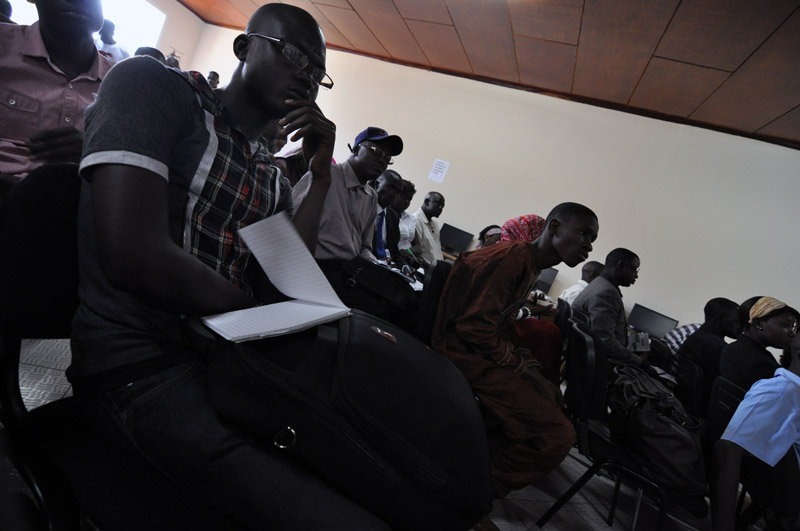More than seventy students of the University of The Gambia attended a symposium about the importance of research for effective human rights practice. They listened to and critically engaged with speakers from the African Commission on Human and Peoples’ Rights, the Special Criminal Court of The Gambia and their own Faculty of Law. Moreover, they benefitted from presentations by the Institute for Human Rights and Development in Africa (IHRDA) and HURIDOCS on the African Human Rights Case Law Analyser.
The Case Law Analyser (CLA) is a joint project between IHRDA and HURIDOCS and is the tool to gain effective, exhaustive, free and easy access to human rights case law from all African regional bodies, including the African Commission, African Committee of Experts on the Rights and Welfare of the Child, the African Court, the East African Court of Justice, the ECOWAS Community Court of Justice and SADCT.
Students want to raise awareness of the Case Law Analyser
During the symposium, students were thoroughly introduced to the key features of the CLA. Among these are various ways of browsing decisions and finding what (not only) students are looking for, e.g. by articles, keywords and references. Moreover, they learned how to use built-in analytical tools such as the Case Graph. To bookmark single paragraphs and save the progress of their research, students were introduced into creating accounts and using them.
The overarching theme of the symposium, which took place 23 March, was the importance of research for the promotion and protection of human rights. It was initiated and organised by a group of students from the Faculty of Law, who worked through many a night to raise awareness about the CLA among their fellow students.

Research makes or breaks a case, Legal Officer says
The fundament for the demonstration of the CLA was laid by a number of excellent presentations on the importance of research.
Students benefitted from an exceptional talk by Samuel Tilahun, Legal Officer at the African Commission, who introduced students to the working of the Commission and how it changed with the advent of technology.
He also stressed that thorough research is still the most important element of writing successful complaints to the Commission to take decisions on human rights violations. The CLA makes this research easier, Samuel said. ‘You don’t have to spend sleepless nights at the library to get all this information; it’s a mouse click away.’
Access to information is a right
Samuel said that another great resource for future work and current assignments is the Commission’s website – developed by HURIDOCS and Ketse.com – where they can find all necessary information, e.g. rules of procedure, and useful databases, e.g. on the prevention of torture.
He stressed that all this is available, because students have a right to information, a right that everyone enjoys. The Commission, other bodies and states are obliged to be open about their proceedings and publish what they produce. Samuel urged students to demand the implementation of their right whenever a body or a state fails to provide information.
Human Rights Require Constant Commitment
‘Legal research is at the core of legal action’, Justice Emmanuel Nkea, Judge of the Special Criminal Court of The Gambia, said. Hence, he called students to be thorough and passionate in what they do and dedicate themselves to human rights, as they ‘require commitment to make them work’.
He suggested that they could do that not only as legal practitioners, but also through other means, e.g. campaigns. Justice Nkea, concluded that good research and getting the facts right is pivotal for all these undertakings.

Less Facebook, more Research – Dean says
The Dean of the Faculty of Law, Dr Abukabar Sengore, praised the student initiative that took the lead in organising the symposium and called others to spur more such undertakings, in- and outside the university. He argued that the promotion and protection of human rights depends on the efforts of individuals, and so does learning.
Replying to a student who said that unstable internet access was a problem in using the CLA, Dr Sengore stated that miraculously students find the time for Facebook and hence it may be a matter of priorities. He added that the faculty was working hard on improving the internet connection, however.
In the closing remarks, Dr. Sengore stressed that it is about initiative, about the students wanting to improve the country they live in and the human rights situation on the continent. These thoughts were met with applause and lively debate.
HURIDOCS is very thankful for the student initiative – Assiatou, Aisha, Awa, Lamin and Aisha – that organised the symposium in a matter of less than a month. It all started with a reply to one of our newsletters, in which Johannes Buabeng-Baidoo, lecturer at the University of The Gambia, explained how he uses the case law analyser in his teaching. We welcome more such initiatives and also want to thank Johannes for being the most excellent master of ceremony at the symposium. Last but not least we are grateful that our colleagues at the IHRDA supported the symposium intensely and work hard every day to keep the Case Law Analyser up to date.
